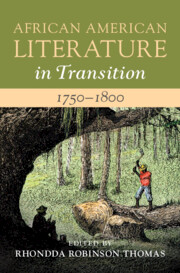Book contents
- African American Literature in Transition, 1750–1800
- African American Literature in Transition
- African American Literature in Transition, 1750–1800
- Copyright page
- Contents
- Contributors
- Preface
- Chronology
- Introduction
- Part I Limits and Liberties of Early Black Print Culture
- Part II Black Writing and Revolution
- Chapter 4 Anglo-Africans Writing Themselves into History during the Age of Revolution
- Chapter 5 Joining the Revolution
- Chapter 6 Black Literary Engagement with the Haitian Revolution
- Part III Early African American Life in Literature
- Part IV Evolutions of Early Black Literature
- Index
Chapter 5 - Joining the Revolution
African American Writing in the Era of Independence
from Part II - Black Writing and Revolution
Published online by Cambridge University Press: 01 April 2022
- African American Literature in Transition, 1750–1800
- African American Literature in Transition
- African American Literature in Transition, 1750–1800
- Copyright page
- Contents
- Contributors
- Preface
- Chronology
- Introduction
- Part I Limits and Liberties of Early Black Print Culture
- Part II Black Writing and Revolution
- Chapter 4 Anglo-Africans Writing Themselves into History during the Age of Revolution
- Chapter 5 Joining the Revolution
- Chapter 6 Black Literary Engagement with the Haitian Revolution
- Part III Early African American Life in Literature
- Part IV Evolutions of Early Black Literature
- Index
Summary
Scripting their own lines, African Americans in Britain’s North American colonies early joined in the fresh discourse touting “the rights of man” that propelled the US era of independence. They heard from the works of Locke, Montesquieu, Rousseau, and others attacks on authority derived from anything other than personal consent, and they turned that to attacks against their enslavement and subordination. From religious rhetoric emphasizing slaveholders’ Christian hypocrisy, they moved more and more to political arguments against their condition, deploying rhetoric of individual rights as evidenced in governmental petitions and other writings particularly from the 1770s through the 1790s. Shifting from merely escaping slavery, African Americans moved to embrace equal protections and rights regardless of race. They escalated from appeals to white conscience to appeals to Black consciousness. Pressing for a new day, African American writers advanced not only Christian brotherhood but also a brotherhood of shared African ancestry engaged in cooperative action for mutual recognition, relief, benefit, and advancement to escape exclusion from the promise of American life.
Keywords
- Type
- Chapter
- Information
- African American Literature in Transition, 1750–1800 , pp. 123 - 147Publisher: Cambridge University PressPrint publication year: 2022

